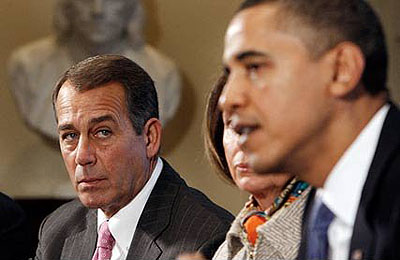I never have a good sense of how much to trust Bob Woodward, so I’d take the following recreated dialog with a grain of salt. Still, here it is. It’s all taking place at the tail end of last year’s debt ceiling talks, after John Boehner has pulled out of negotiations twice, House Republicans are loudly refusing any compromise at all and  threatening to let the nation default, and the only GOP offer on the table would raise the debt ceiling for less than a year. If he agreed to it, President Obama would have to fight the same battle all over again in the middle of an election year:
threatening to let the nation default, and the only GOP offer on the table would raise the debt ceiling for less than a year. If he agreed to it, President Obama would have to fight the same battle all over again in the middle of an election year:
“So,” the president said, “if we give $1.2 trillion now in spending cuts” — the amount in the House bill to get the first increase in the debt ceiling for about six to nine months — “what happens next time?” The Republicans would then come back next year, in the middle of the presidential campaign, and impose more conditions on the next debt ceiling increase. He could not give the Republicans that kind of leverage, that kind of weapon. It was hostage taking. It was blackmail. “This will forever change the relationship between the presidency and the Congress.
“Imagine if, when Nancy Pelosi had become speaker, she had said to George W. Bush, ‘End the Iraq war, or I’m going to cause a global financial crisis.’ ”
So, Obama said, they had to break the Republicans on this. Otherwise, they would be back whenever it suited them politically.
They were out of options, Geithner said. The only one might be accepting the House bill, loathsome as it might be. “The 2008 financial crisis will be seen as a minor blip if we default,” he said.
The president said, “The Republicans are forcing the risk of a default on us. I can’t stop them from doing that. We can have the fight now, or we can have the fight later on, but the fight is coming to us.”
So, no, Obama said, he was not going to cave. Period. He said good night, got up and left. He was very agitated.
….Obama never had to confront the veto question. A few days later, House Republicans dropped their insistence on the two-step plan. The final plan accepted a debt limit increase that would take the country through the 2012 presidential contest. It also postponed $2.4 trillion in spending cuts until early 2013.
Interesting. If this is really how it all went down, Obama is a harder-nosed negotiator than most liberals have been giving him credit for.

















